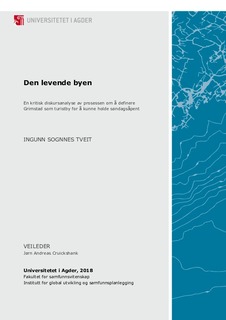| dc.contributor.author | Tveit, Ingunn Sognnes | |
| dc.date.accessioned | 2019-03-11T10:37:40Z | |
| dc.date.available | 2019-03-11T10:37:40Z | |
| dc.date.issued | 2018 | |
| dc.identifier.uri | http://hdl.handle.net/11250/2589546 | |
| dc.description | Masteroppgave global utvikling og samfunnsplanlegging UT505 - Universitetet i Agder 2018 | nb_NO |
| dc.description.abstract | During afortnightin May 2017,commercial Sunday opening hours during the summer season were debated in the local newspaper in the small city of Grimstad, Norway. Norway applies a strict policy of closed commercial outlets on Sundays. By possibly defining the city as a «Tourist sight», a dispensation from the regulated commercial opening hours could be requested from the County of Aust-Agder. However, prior to such an application, a consensus among the politicians in the municipality of Grimstad needed to be reached. During the first municipality council meeting the majority voted against such an application, which lead to a heated debate. When asecond vote was held, itendedin a majority vote in favour applying for a dispensation.The purpose of this assignment is to identify the discourses, communication and power in this process. By running a critical discourse analysis inspired by Norman Fairclough, I sought to find the answer. My thesis question is:Which discourse held thehegemonyin the process about defining the city of Grimstad as a «Tourist sight», andhow was the different discourses communicated?The results from the critical discourse analysis constitute that the discourse«The living city»holds the hegemony. The discoursehas gained this hegemony through the power of language. By using positive words in favour of the discourse, argumentation and intertextuality thehegemony has been fortified. The great occurrence of intertextuality also indicates a change of attitude. Shopping at Sundays is more acceptable than before, due to market liberalisation. The other identified discourse «everyday life»is undermined with negative titles and poor argumentation.The local newspaper has made its obligations to the journalistic community contract by facilitating the debate, but it could be more critical. The newspaper has promoted the discoursein hegemony–which have been of great importance for the local retailers. The discourse «The living city»is uncriticallypresenting extended opening hours on Sundaysas the key to prevent a dying city centre. The bonds between the newspaper and the retailers might indicate that an economic power is a drive force. | nb_NO |
| dc.language.iso | nob | nb_NO |
| dc.publisher | Universitetet i Agder ; University of Agder | nb_NO |
| dc.rights | Attribution-NonCommercial-NoDerivatives 4.0 Internasjonal | * |
| dc.rights.uri | http://creativecommons.org/licenses/by-nc-nd/4.0/deed.no | * |
| dc.subject | UT505 | nb_NO |
| dc.title | Den levende byen : En kritisk diskursanalyse av prosessen om å definere Grimstad som turistby for å kunne holde søndagsåpent | nb_NO |
| dc.type | Master thesis | nb_NO |
| dc.subject.nsi | VDP::Samfunnsvitenskap: 200::Statsvitenskap og organisasjonsteori: 240 | nb_NO |
| dc.source.pagenumber | 89 p. | nb_NO |

